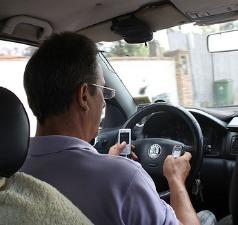BOB GARFIELD:
New York Times reporter Matt Richtel won a Pulitzer for his series on distracted driving. He says that Americans love cars and Americans love phones and that together they're irresistible.
MATT RICHTEL:
You can think of it as chocolate and peanut butter. For a lot of people the mixture is very desirable.
BOB GARFIELD:
[LAUGHS] What makes this so tasty and delicious?
MATT RICHTEL:
Physiologically, some have called it in research the dopamine squirt. You hear your phone and you get a little kind of neuro-chemical burst that says, ooh, how exciting. That's physiological.
On the psychological level, and let's assume for a second we can divide psychology from physiology, but the lure of the phone has something that researchers call the lottery ticket syndrome. You never know when the good email's gonna come in, so you are compelled to check every one.
BOB GARFIELD:
We've become accustomed to being connected, you know, more or less 24/7. And the bonus of being in the car is that it's no longer dead time; you can be productive.
MATT RICHTEL:
There's a guy named David Teater. His son was in the back seat of a car that his mother was driving, and a woman who was on the phone with, of all things, her church, hit the car, killing David Teater's son. And David used to commute in the car and talk on the phone a lot. And after this happened he got in the car and he [LAUGHS] realized he couldn't resist the ping of his phone. And he was like, what is going on, can it be so powerful that, having lost my son, I still can't avoid the phone?
And he took to locking his phone in the trunk, and to him it underscored, and to me it underscores, just how powerful the lure of the device, that for some people they must lock it away; otherwise, it beckons.
BOB GARFIELD:
I understand that some people view the NTSB's recommendations as an infringement on their personal liberties, but don't the stakes of this problem change the political landscape at all?
MATT RICHTEL:
One would think, but for a long time people drove drunk, and they got away with it. You know, maybe they only did it ten times in their lives, but they never got in an accident, so even though they heard it was bad for you, they didn't have a problem. So that reduces your impetus.
But something else very interesting happened in the drunk driving conversation in the nineties. They changed the conversation from being about "accidents," quote, unquote, to being about "crashes," quote, unquote.
I think that people exploring this issue right now are trying to figure out what is the right conversation to have to provoke people to think about the risks they're undertaking for themselves and others.
BOB GARFIELD:
And I must ask you this, Matt. You're covering this story on an ongoing basis for The Times, but you're also kind of a crusader on this story. You must have been pretty pleased by the National Transportation Safety Board's advisory.
MATT RICHTEL:
What I am a crusader about is asking questions that are fair to ask, in light of the ubiquity and compelling nature of this technology, that I don't feel like we've asked enough of. I think the proof in that is the reception that these stories and these ideas keep getting. A lot of people are wondering what's going on.
BOB GARFIELD:
One quick follow-up: What's going on? [LAUGHS]
MATT RICHTEL:
I'll tell you, what's going on is a sweeping change well on the order of the industrial revolution, where the nature of how we live our lives is undergoing a quantum shift. Like any other quantum shift, say the processing of food, there are a lot of good things, meaning more food, easier to get in more remote places. There are also side effects, like nutrition and health questions. There are fair questions to be asked that we are only at the very beginning of.
BOB GARFIELD:
Thank you very much.
MATT RICHTEL:
Thank you for having me.
BOB GARFIELD:
Matt Richtel is a reporter for The New York Times.
